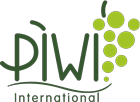Since classic cross breeding is relatively complex, they mainly come from public research institutes, breeding institutes or universities. But some private breeders have also had great success! Breeding is practically in almost all wine-growing countries. You can find an overview of the breeders here
Yes, resistance breeding has even been intensified in recent years! New processes supported by molecular biology make the selection process faster and more efficient.
When we say natural breeding, it means we're still crossing like we've done for the last 150 years to put the male seeds on the pistil of the female flower part, so nothing changes.
What is happening now is the application of new crossing methods in the laboratory. Scientists are still working on individual genes or parts of DNA, RNA.
PIWI International is closely monitoring these new methods approved in the US and other countries; at the moment we do not accept new crossed strains from the laboratory.
No! PIWIS are not the product of trans- or cis-gener manipulation. They are obtained by means of classic cross-breeding by artificially pollinating the castrated flowers of a "mother variety" with the pollen (pollen) of a "father variety". The seeds of the resulting berries contain the "newly combined" genetic information. These seeds are sown, seedlings are created - new plants. With luck, one of them will match my breeding goals.
Yes! PIWIS are ecologically, economically and socially sustainable. Significantly fewer treatments for fungal diseases mean fewer passages, significantly less need for pesticides, less soil compaction, less CO2-Emission, significantly lower treatment costs, less danger to the health of the user!
Every grape variety has its own unique smell and taste profile, which is why PIWIS taste a little different. In the breeding process, however, attempts are made to get close to their aroma profile by crossing traditional, conventional grape varieties.
Ripe harvested and carefully processed grapes from PIWI grape varieties result in excellent wines with top quality. Blind tastings regularly prove this!
Flower Muscat, Muscaris, Rathay, Roesler, Souvignier gris
Bronner, Cabernet blanc, Cabernet Jura, Donauriesling, Donauveltliner, Johanniter, Pinot Nova, Regent
Tannins are components of the stems, stones and berry skins and contribute to the taste of the wine - especially with red wine. Some tannins also act as phytoalexins in the vine, which are defense substances against infections with microorganisms such as fungi or bacteria. PIWIS have a higher potential for this defense mechanism. Bitterness in wine - especially white wine - is only the result of inadequate, not gentle grape processing!
YES.
Vines from resistant cultivars are generally crosses within the European, American, and Asian Vitis families.
They have been grafted onto the most common rootstock varieties to optimize rooting quality and activity on specific soils.
And if so, why?
The goal was to mix the characteristics and optimize the plantings in viticulture;
In addition, the risk and the problem of volume and quality losses in the vineyard should be reduced and the ecological danger for people and nature should be reduced.
The market in the USA seems to be on the up. PIWI International keeps getting requests for samples. Please email to office@piwi-international.org
Pierre Basler, founding member of the association, chose the following name when it was founded in December 1999: "International Working Group for the Promotion of Fungus-Resistant Grape Varieties". In the first writings by Pierre, he still writes about interspecific grape varieties. In June 2000, the abbreviation PIWI appeared for the first time after the designation "International Working Group for the Promotion of Fungus-Resistant Grape Varieties".
Later, Pierre Basler wrote about PIWI wines shortly before his illness. In January 2004 there was an emergency meeting after Pierre's illness. After Pierre's retirement, there were long discussions about names. Mathias Wolff then ended this by declaring:
"We do have a name" why don't we appear with this as: "PIWI-International" . According to old documents, PIWI-International appeared for the first time at the Intervitis in May 2004 with a tasting offer for PIWI wines. The PIWI International logo was probably created at this point in time, as this appears in the documents from mid-2004.
In summary, Pierre Basler switched from interspecific to PIWI in 2000. Mathias Wolff then clearly ended the discussions in 2004 and introduced PIWI as the name of the club.
Edy Geiger in June 2022
In order to be able to answer inquiries via our website, we look forward to receiving your message on the subject office@piwi-international.org
The international working group for the promotion of fungus-resistant grape varieties was founded by Dr. Pierre Baseler and some founding members in 1999. In June 2000, the term PIWI appears for the first time behind the designation. After Pierre fell ill and dropped out, there were long discussions about the name. Mathias Wolff then ended this discussion and created “PIWI-International”. In October 2004, the PIWI word and picture mark was applied for entry in the trademark register and entered in 2015.

